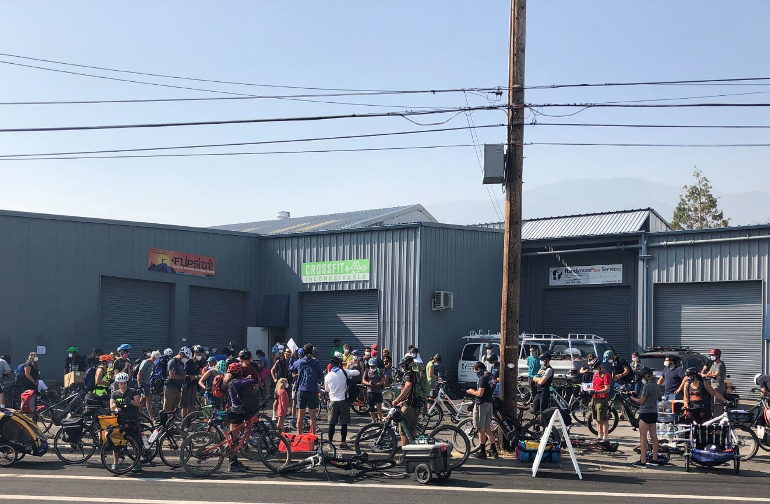In the face of devastation, locals mobilized to coordinate both immediate & long-term security for those most affected by the blaze.
On the morning of September 9th, a grass fire in Oregon’s Rogue Valley was fueled by strong winds and soon turned catastrophic, tearing through the towns of Phoenix and Talent, destroying over 2300 residences — many of which were in mobile home parks housing the elderly and low-income and migrant workers.
The morning after, while the fires continued to burn, members of the local community began to take stock. The devastation was overwhelming. In the words of volunteer firefighter, Julie Grable, “You think, ‘It won’t happen here’. You’ve seen the footage of Paradise, or Santa Rosa, or Mendocino, and you think, ‘Oh, those poor people.’”

It all happened so fast. The temptation was to shut down and succumb to the shock. Instead, a group formed in neighboring Ashland and started to figure out how to help. Following a reconnaissance bike ride through the ashen remains of Talent, Post Growth Institute (PGI) co-founder Donnie Maclurcan, who works to mobilize communities by matching offers and needs, posted on a local Facebook group. He put a call out for volunteers to bike in essentials to people in Talent who were unable to leave their homes. The water and power supplies were off, leaving vulnerable residents stranded. Almost all vehicle access was blocked.
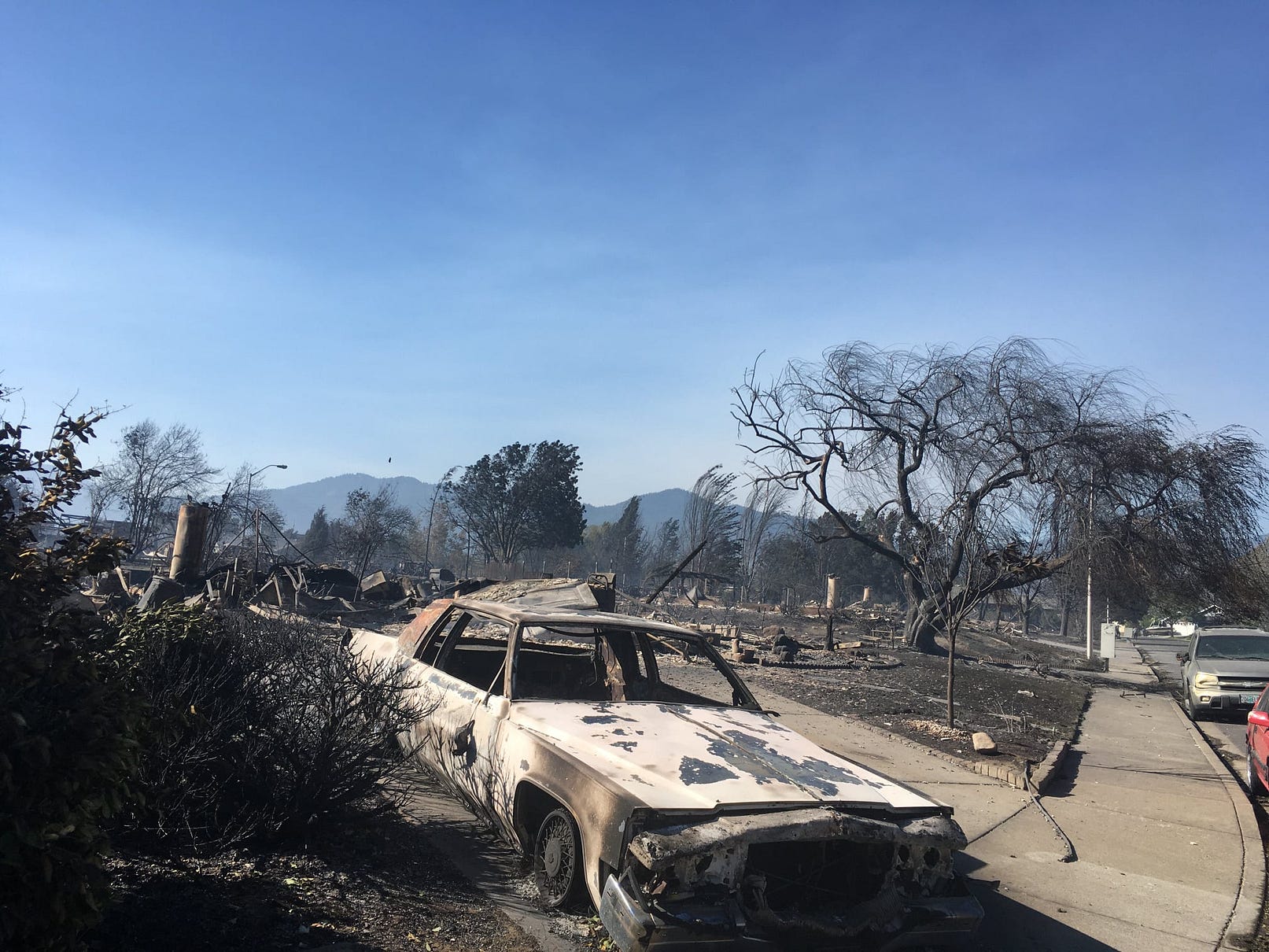
A scene from Donnie’s ride into Talent
With that call-out, the Ashland Bike Brigade was formed and volunteers gathered food and water to deliver to those in need. That day, eight cyclists delivered over 50 gallons of water to stranded residents in Talent. The crew also distributed food and took photos of properties for people who evacuated and did not known the fate of their home.
Less than 24 hours later, the Bike Brigade’s numbers had swollen to more than 100 people, including some who had lost their own homes. Volunteers were out delivering water, food, information, and support to people who had remained in or returned to fire-ravaged Talent.
Reporting on the day, Donnie wrote:
Like yesterday, we encountered people without any electricity, water, phone, Internet or means to leave town. Often elderly, and/or with disability, and without friends/family able to assist. Some people said we were the first people they’d seen in days.
Braving toxic smoke conditions, the group reached an estimated 95 percent of the 2,000 homes that remained standing and, thanks to a group of volunteers on dirt bikes, were able to get to people in the most remote and hard-to-access areas.

The Ashland Bike Brigade riding into smouldering Talent
The following day, after an overwhelming response to calls for water donations, the Ashland Bike Brigade was ready to continue their work.

But by this time, the smoke was at hazardous levels and local authorities were restricting access to neighboring towns.
Two local men, Lebeau Potgieter and Derek Sherrell, managed to negotiate truck access and, with the help of many volunteers, the group was able to deliver 300 gallons of water to the Rogue Action Center in Talent, a makeshift hub set up after the organization’s HQ in neighboring Phoenix burned down. Soon after, resident Sarah Shaw secured a generator, which was swiftly trucked in, too.
Meanwhile, the volunteer database swelled, the group’s text alert system was established, and their efforts made the national news. Each day brought more momentum, more mobilization, and more impact.
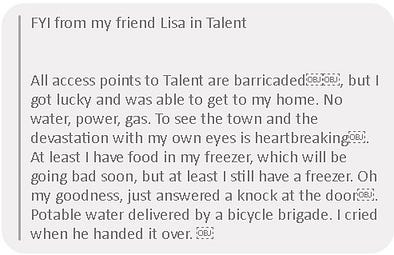
On September 14th, another 300 gallons of water was delivered, and a local woman offered to donate an entire Shasta water truck to continue the water deliveries. Two powerful generators were secured and delivered to Jackson County Fire District #5, who were still without electricity.
Water donations continued to pour in, including a massive donation from local bakery, Mix Bakeshop, and from all over the world via the newly created Amazon wishlist, Almeda Fire Relief Support for Oregon.
A team of volunteers started databasing and coordinating volunteer requests for the Ashland Bike Brigade, as well as mapping the inventory of needs across the entire Valley’s distribution centers. (The first call from the database was for volunteers to run security shifts at a local Mexican restaurant that was coordinating monetary donations, between midnight and 6am that night, in toxic smoke. All the shifts were filled in 20 minutes.)
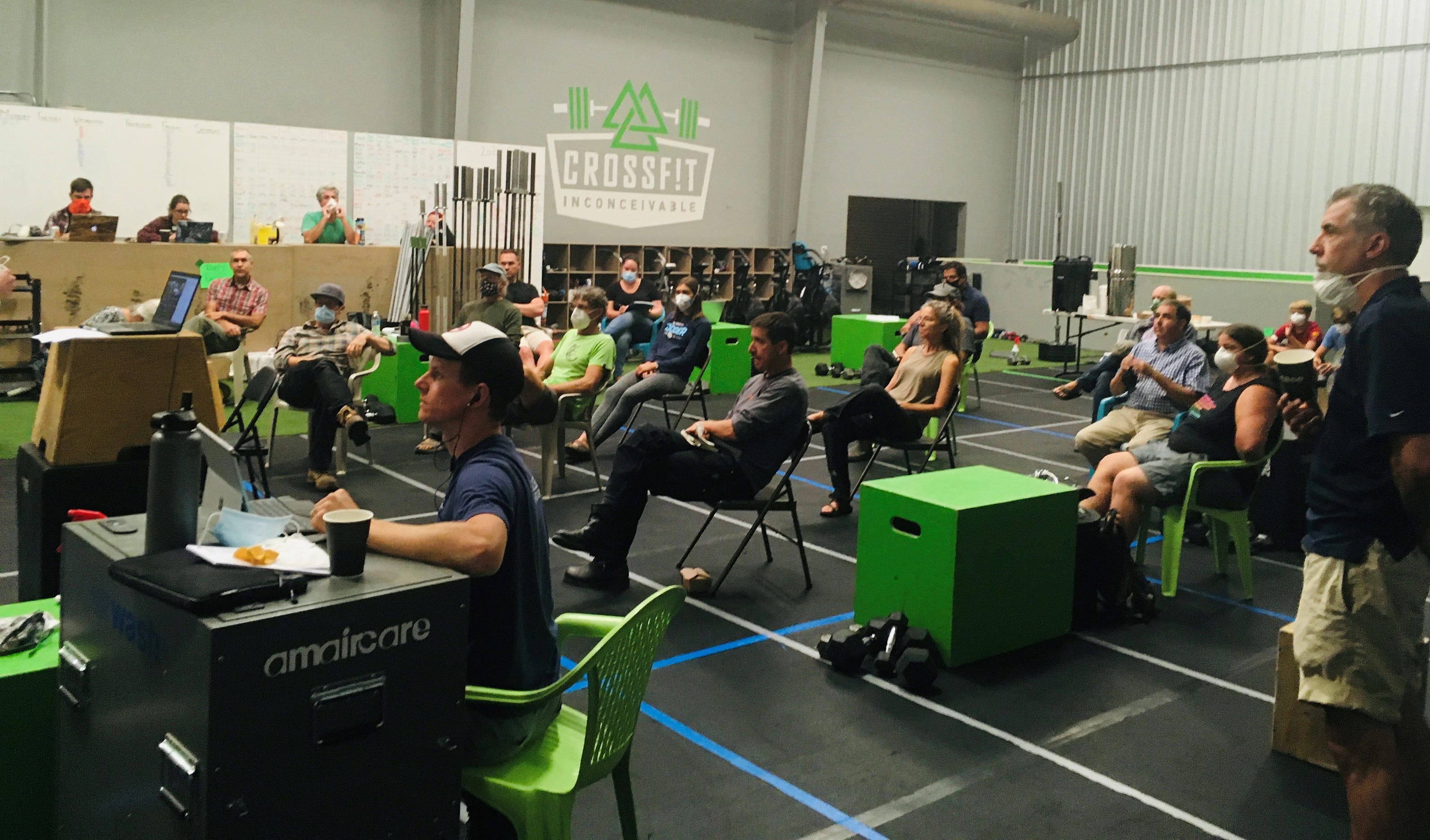
Local handyman John Palombo and Atlas Newman of the Rogue Volunteer Initiative assembled over 170 builders to help rebuild residences, while Donnie and Lebeau pulled together 50 partners (from State Senators to donors, property owners, town planners, town mayors, disaster relief specialists, equity and diversity workers, to educators and builders) for a hybrid Zoom and in-person meeting to advance an idea to create equitable, sustainable, community- and family-owned housing using refurbished RV’s, buses, shipping containers, and tiny houses (which later became the Rogue Valley Homes and Shelter Relief initiative). “The buy-in was incredible,” said Donnie. “I’ve never seen such an amazing pledge of resources.”
On September 14th, the electricity come back on in Talent. The brigade matching database and alert system now fully functional, thanks to the hard work of PGI member Dani Leonardo and land stewardship educator Jeanine Moy, people’s offers and needs were being matched more efficiently than ever. A local named Tyler gave two bikes to a family whose cars had been destroyed by fire — among numerous other acts of generosity.
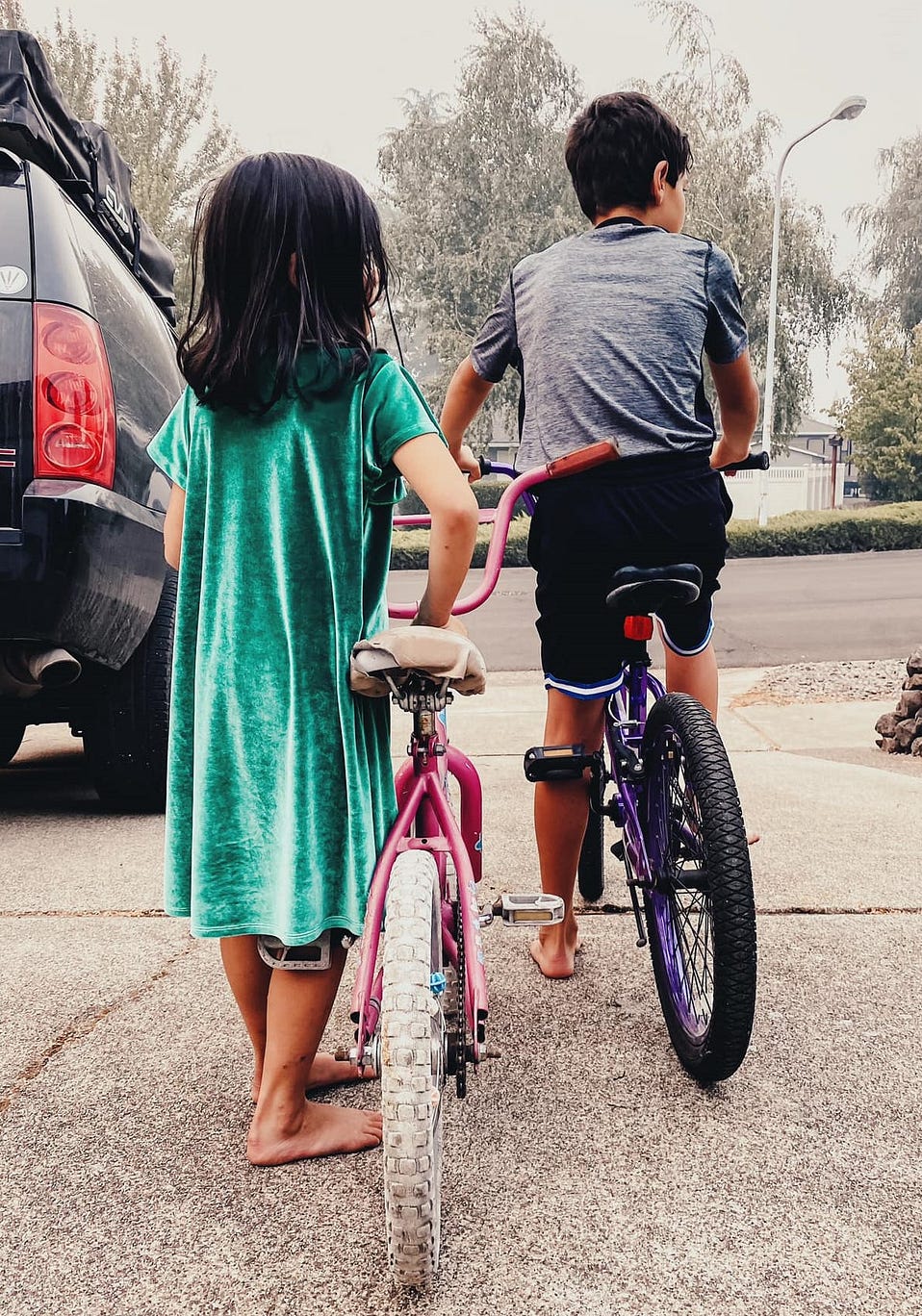
Local city councilor Julie Akins reignited her efforts to convert drivable, barely used buses into tiny homes. Offers of land, labor, and capital poured in for the Rogue Valley Home and Shelter Relief project, including fiscal sponsorship by the MRG Foundation.
Then Tom Llewellyn from Shareable called to announce the donation of 10,000 Kn95 masks.
When communities mobilize in this way, it reminds us that there need not be barriers to alleviating people’s basic needs.
That same evening, Donnie wrote:
Oftentimes I find myself surrounded by the kind of people that remind me that anything’s possible. Just by the very nature of their vision and can-do attitude. Tonight was one of those times.
I’ve never felt so exhausted, yet I’ve never felt so hopeful that, in the wake of the devastation of the #Almedafire, we can provide shelter in the near-term, and rebuild permanent housing in the long-term, that is safe, sustainable, and family- and community-owned, all through an equity-centered process.
And then there is so much that is invisible, and will remain invisible. The stories of hope, tragedy, perseverance, and the mundane that will never be told, during this time, or otherwise. The stories of the caregivers, the educators, the single parents, the undocumented migrants, the BIPOC community leaders, the behind-the-scene weavers, the social media managers, the city administrators, the social workers, the assessors, and so many more.
These stories may not be told, but they are part of the mythic fabric that binds us. They exist in a space we can all reach merely by closing our eyes, connecting with our hearts, and re-membering that we are all one.
If you’d like to contribute to the ongoing efforts to support individuals and businesses affected by the Almeda Fires, you can donate to:
- The Rogue Valley Relief Fund, which works to meet the immediate and longer-term needs of those who have been displaced.
- Rogue Food Unites, which works with mutual goals of sustainability and local responses to food aid via local restaurants, farms, and food purveyors.
- These GoFundMe pages for families and individuals who are struggling.
Teaser photo credit: The Ashland Bike Brigade by Andre Carvalhaes


